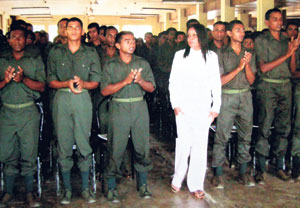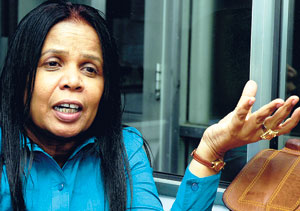Theories are rife as to what empowered the Sri Lankan armed forces to finally defeat the Liberation Tigers of Tamil Eelam, after struggling for almost three decades to put down one of the world’s most brutal and dreaded terrorist organisations. Much of the armed forces’ success has been attributed to political and military leadership, and superior planning and strategy.
These were vital factors for victory. But equally vital was the high morale of the troops. It was their positive, can-do attitude and spirit that helped them overcome the previously unassailable obstacles standing in the way of total military victory.
 |
| Counsellor Manabarana has had overwhelmingly positive responses to her counselling sessions in military camps and police stations across the country. |
According to psychologist Sujatha Munasinghe Manabarana, the troops who fought in the final battle against the LTTE believed in themselves and their ability to get the job done, unlike in the past, when soldiers were routinely disheartened by military reversals.
Ms. Manabarana is one of a team of professional counsellors and psychologists who have been working for years behind the battle scenes to help troops deal with war-related stress and other psychological problems. Trained in human psychology, with an emphasis on military psychology, she has been counselling members of the armed forces and the police since 2003.
“Behind the stoic, brave faces of the smart men in uniform are human beings with very real human problems – putting on a uniform does not change that,” says Ms. Manabarana, who has worked with thousands of men who have served at the battle front. “Counselling to give them a positive outlook is crucial.”
Most young men join the military when they are in their late teens or early twenties. In addition to their training as soldiers, they also need counselling, in case they have any personal problems. The majority of soldiers have been separated from their families for the first time in their lives, and like any normal person, they too long to be with their family and friends, especially after being away from home for long stretches of time.
Many fresh recruits to the Police, the Army, Navy and Air Force even consider deserting and returning to the comfort zones of their villages and home towns. Here too, counselling goes a long way to help recruits and servicemen stay focused on their job.
“We start a session saying it will last about four hours, but usually these go on for much longer,” she says.
“Part of the counselling is talking to the parents, wives and girlfriends of these men and reminding them of the vital role their loved ones are playing in protecting the country,” she says. “I have told the mothers of soldiers that their sons are fighting for all the mothers of this country.”
Ms. Manabarana says she has worked in military camps and police stations in all parts of the country, from South to North, and that she has always had an “overwhelmingly positive” response to her counselling sessions.
 |
| Sujatha
Munasinghe Manabarana |
She says she has received dozens of letters from grateful soldiers, thanking her for helping them get over their fears and insecurities.
“Most soldiers don’t realise how highly they are regarded and respected by the civilian world. I try to build up their self-esteem. I tell them they are the real superstars of Sri Lanka. Realising their worth boosts their morale and confidence,” she says.
Although the war is officially over and combat operations have ground to a halt, Ms. Manabarana says her counselling work with the troops is not over. Many soldiers will continue to need psychological counselling long after the war. She also hopes to work with disabled soldiers and the families of dead soldiers.
Post-war Sri Lanka will be in need of people with Ms. Manabarana’s skills. Civilians too suffered from trauma as a result of the 26-year-long strife, and they too will be part of her future counselling programme.
“For the soldiers, this war was not about race or religion,” she says. “It was about freeing the country from the grip of terrorism, and they achieved that goal. We should not forget their courage and their contribution.” |


